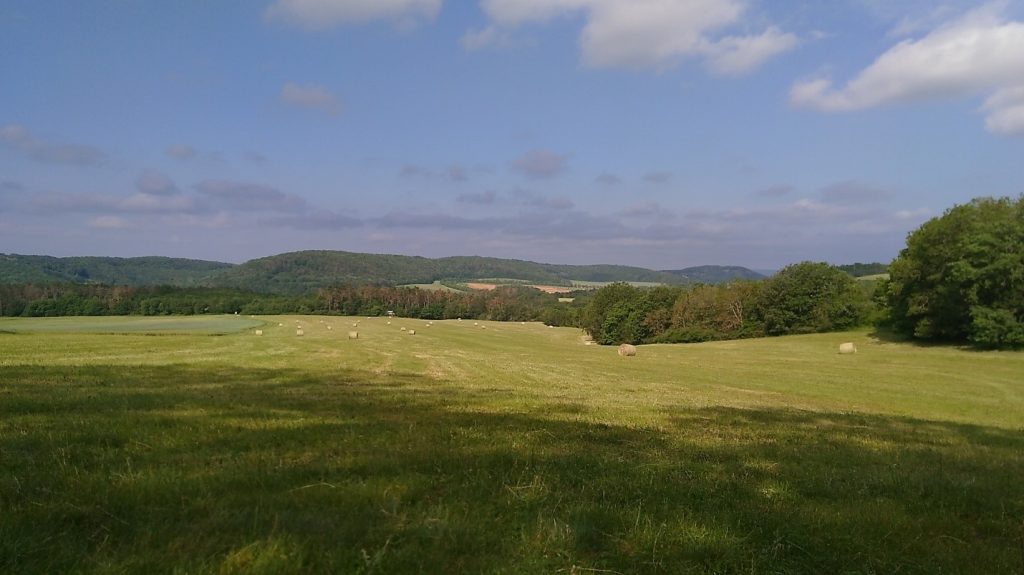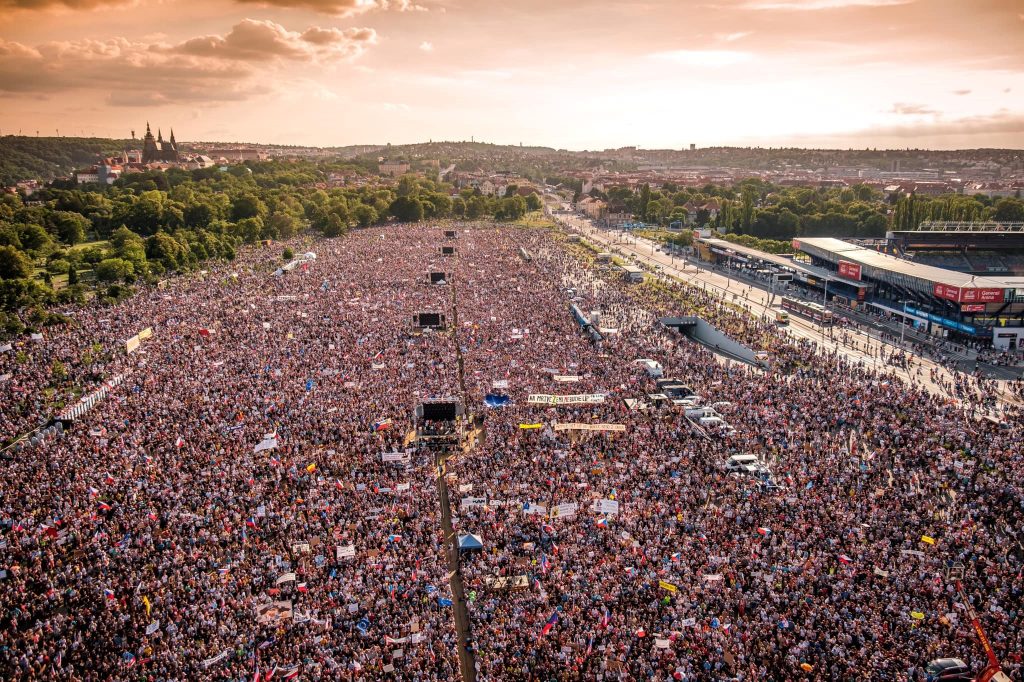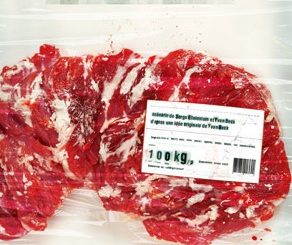
Drought, insect infestations, biofuels and monocultures are impacting Czech agriculture and the ability of the soil to do its jobs, from water storage to erosion prevention. In part one of this series we exposed this troubled ecology of soil, forests and water. Next, we look at how history, politics and policy have shaped the lie of the land. With Louise Kelleher in Prague.
Czech agriculture is close to breaking point, warns farmer Daniel Pitek. As we saw in part one of this series, monoculture forests and large-scale industrial farming are not pulling their weight in the water cycle, leaving the soil even more vulnerable to the effects of climate breakdown. Throw into the mix a Communist legacy of collectivized farmland and the runaway subsidies that came with EU membership, and Pitek estimates it’s only a few short years before the Czech Republic runs out of water and loses the capacity to grow food.
It’s an irony of history that the Communist regime sowed the seeds of the current profit-at-any-price model. The vast monoculture fields that are so ubiquitous in the Czech Republic trace their roots to four decades of collectivized farmland under Communism, when small holdings were merged into centralized mega farms.
Modern-day technology, machinery and chemicals have given this legacy of large-scale industrial farming an alarming new lease of life. “The pressure on the land is tremendous,” notes Pitek. After the Velvet Revolution and a lurch back to capitalism, the “Wild East” of the 1990s witnessed a land grab fuelled by dirt cheap prices for land that “no-one wanted”. Pitek describes how using money he earned as a plasterer in Germany he was able to return home at that time and buy up 600 hectares in the Central Bohemian Highlands. Today he finds himself on the frontline of a broken system.
Size matters
Chair of the Litoměřice branch of the Czech Farmers’ Association (ASZ), Daniel Pitek runs one of the largest small farms in the country. His sheep, cows and horses graze on 600 hectares of pastureland dotted with ponds, wetlands, and orchards of local heirloom species.
“The biggest threat to the Czech countryside is large-scale industrial farming,” Pitek tells anyone who will listen. The Czech Republic has the largest farms in Europe, with an average landholding of 133 hectares according to the Agricultural Atlas.
This small Central European country is also an agro-industry giant. Pitek slams the trend towards monoculture fields of “up to 500 hectares” in an interview with current affairs magazine Reflex. In an interview with online news channel DVTV, Pitek draws a parallel between the political blind eye turned to the harmful practices of Big Farming and the current ecological catastrophe in Czech forests. Despite warnings as far back as the 1950s of the bio-vulnerability of intensive spruce monocultures, the practice has continued, with the result that spruce forests have been decimated by an infestation of bark beetle more devastating even than the acid rain crisis of the 1980s, he maintains. “We’re already destroying the soil,” says Pitek, calling out a wilful ignorance to heed the warning signs of another impending ecological catastrophe. “What will happen,” he asks, “when ten years from now it isn’t fertile?”
Czechs compare their farming practices to neighbouring Austria, where smaller holdings and a greater diversity of crops are the norm. In a report entitled “Flight over Vast Fields of Rapeseed”, Czech Television captured aerial footage of the stark differences on either side of the Czech-Austrian border (the plane crosses into Austria at 1:04). The Czech Republic has the highest concentration of oilseed rape in Europe, planted in 16% of farmland nationwide compared with 3% next door in Austria. “We inherited the huge fields from the Communist regime, but unfortunately we’re acting the very same with them, or worse,” observes Dr Martin Pivokonský of the Institute of Hydrodynamics, noting how in the Czech Republic chemical inputs are an integral part of rapeseed cropping for the biofuels market.
“Fortunately for us the EU has the last word”
One small farmer who is thriving in the shadow of the agro-industry is the winner of Ecofarm of the Year 2019, Věra Řezníčková, who raises cattle and sheep on a 226 hectare family farm. She comes from a milling family who after the fall of the Communist regime were able to recover 36 hectares near Jihlava in the south of the Czech Republic. Řezníčková inherited this small farm and has expanded it since by buying and renting the adjoining land. She made the switch to ecofarming in 2010, and maintains she uses ecological methods for the satisfaction of doing right by nature, her family and the locals who buy her meat, rather than for the subsidies. Řezníčková sees plenty to be positive about in the current system of subsidies. “The Czech state doesn’t support eco-farming a whole lot, but fortunately for us the EU has the last word,” she told news server Aktuálně. “The EU pushes our state to support environmentally friendly farming, animal welfare and healthier food, and as such to support eco-farming.”
Using public funds to destroy public goods
CAP payments however leave a lot to be desired, according to Josef Stehlík, Chair of the Czech Farmers’ Association (ASZ). It’s high time to cap direct payments for mega holdings, he tells farming news server TV Zemědělec, calling out as “unsustainable in the long term” the current model of direct payments whereby “a factory worker in France pays taxes to subsidize out of his taxes a millionaire’s holdings.” The conditions attached to direct payments must be revised if Czechs are to end the love affair with rapeseed monocultures. As the Czech Farmers’ Association points out, an obvious way to improve the soil’s drought resilience is to stop incentivizing the over-concentration of industrial farmland. It is petitioning the Ministry of Agriculture to stop supporting large-scale industrial faming – a relic of 1950s collectivisation that is damaging the countryside, says secretary of the association Jaroslav Šebek.
“We’re paying taxes to destroy our countryside,” rails Professor Jakub Hruška of the Czech Geological Survey. “The current system of allocating subsidies is leading to environmental devastation. It benefits large firms that […] are not interested in long-term sustainability. They use public funds to destroy public goods: water, soil and the climate.” In an interview with online news channel DVTV Professor Hruška sounds the alarm on biodiversity collapse happening before our eyes: “Large doses of pesticides and fertilisers are destroying the soil, contaminating the water, and exterminating all forms of life,” he warns.
It’s Nice Out

The booming agribusiness sector in the Czech Republic is dominated by Agrofert, an agriculture, food and chemicals conglomerate with a stranglehold over the country’s oilseed rape industry. Agrofert was founded by Prime Minister Andrej Babiš who has been found in conflict of interest by a recent European Commission report. Although the premier placed his business empire in trust funds after coming to power in 2017, the report finds he is still the sole beneficiary, reports the BBC. The Czech Republic may have to pay back some €17 million in EU subsidies, according to Transparency International who filed the complaint that led to the audit. The European Commission has suspended payouts to Agrofert from European Structural and Investment Funds pending an investigation, as has the Czech Agricultural Intervention Fund (SZIF) despite some initial foot-dragging.
On June 4 up to 120,000 Czechs took to the streets to call for the controversy-mired premier to resign. Prime Minister Babiš denies all wrongdoing and insists he hasn’t broken any Czech or EU laws. He credited the fine weather for the largest demonstration since the fall of Communism: “It was nice out.” He has since apologized for the remark, reports Czech Radio. The response from the organisers of the protest was “It’s Nice Out”, a follow-up demonstration in Prague on June 23 that attracted an estimated quarter of a million anti-government protesters. The scale of the protests – as well as the symbolic use of Wenceslas Square and Letná plain – mirrors that of the Velvet Revolution in 1989.
The head of government’s alleged conflict of interest is illustrative of a broken system that is fuelling a catastrophic ravaging of the land. Speaking at the protest, Jaroslav Šebek on behalf of the Czech Farmers’ Association joined the call for Andrej Babiš to resign. Daniel Pitek, also on the podium, called the Prime Minister a symbol of the destruction of the Czech countryside, reports Ekolist news server. Prime Minister Babiš was elected on the promise to “run the country like a business”. But with business as usual killing the soil and sustainable farming, how long can it continue?
More on Czech Republic





